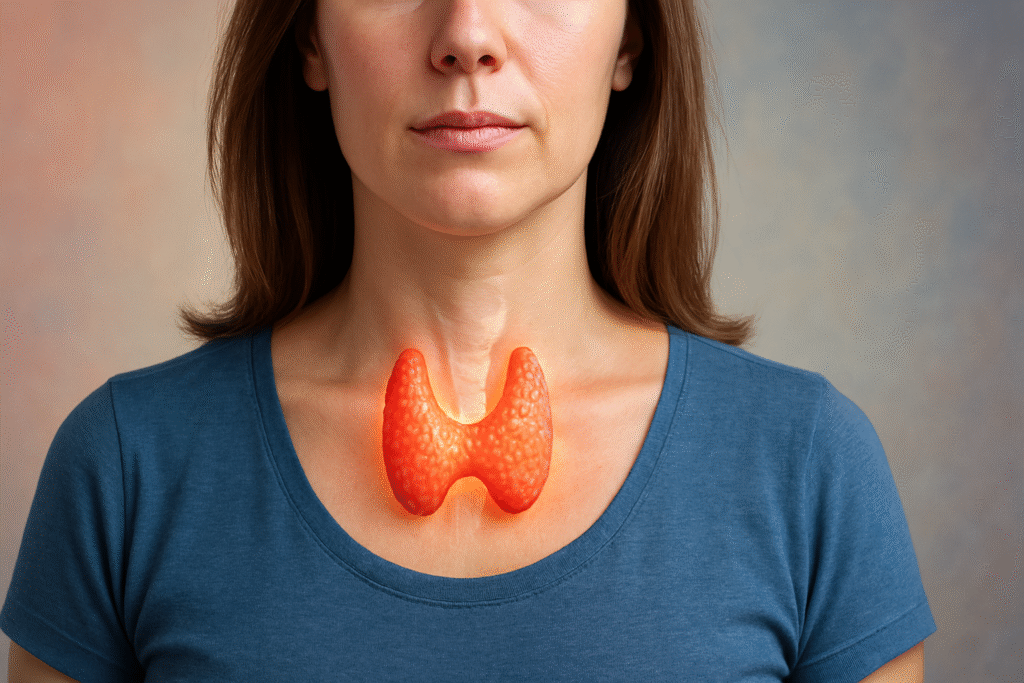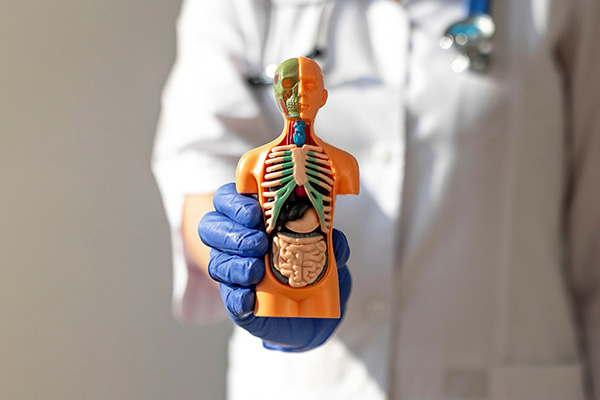Imagine waking up in the morning feeling like your body is behaving strangely, as if things around you are responding slowly or quickly for no apparent reason.
These changes could be signs that your thyroid gland has a message for you. This gland, located at the front of the neck, controls metabolism, hormonal balance, and even mood.
Women are more susceptible to thyroid problems; therefore, specialists at Liva Hospital in Turkey recommend regular check-ups, especially after the age of forty or during pregnancy.
When we talk about thyroid problems, we often refer to two main types: hypothyroidism (underactive thyroid) and hyperthyroidism (overactive thyroid).
Each type carries a set of symptoms that may sometimes overlap.

What is the Thyroid Gland?
Before diving into the symptoms, let’s get to know this butterfly-shaped gland, located at the base of the neck.
The thyroid gland secretes T3 and T4 hormones, which regulate metabolism, body temperature, cell growth, and even mood.
Any imbalance in the production of these hormones, whether an increase (hyperthyroidism) or a decrease (hypothyroidism), causes a comprehensive disturbance in the body.
In women, the importance of the thyroid gland increases due to continuous hormonal changes during life stages such as puberty, pregnancy, and menopause, making them more susceptible to its disorders.
Symptoms of Thyroid Problems in Women
Symptoms vary based on whether the thyroid gland is underactive or overactive, but generally, the following symptoms may indicate problems with this gland.
Fatigue and Constant Tiredness
Initially, fatigue may seem normal after a long day, but if it persists without rest and is accompanied by unexplained weight gain or sensitivities, this could indicate hypothyroidism, as it leads to a decrease in T3 and T4 hormones, a severe slowdown in metabolism, and a constant feeling of exhaustion.
Unexplained Weight Changes
You might be surprised to see the scale fluctuating for no reason; this is common in thyroid disorders.
Hypothyroidism leads to weight gain due to slow metabolism, while hyperthyroidism can lead to weight loss despite a high appetite.
Menstrual and Fertility Disorders
Because hormonal balance is sensitive in women, any imbalance in thyroid activity is reflected in the menstrual cycle.
Hypothyroidism causes heavy or delayed periods, and hyperthyroidism leads to chronic irregularities or complete cessation, and sometimes difficulty conceiving.
Mood Swings and Poor Concentration
These changes may seem similar to daily life stress, but a thyroid imbalance leads to depression and sluggishness or anxiety and hand tremors, depending on the type of imbalance.
These symptoms may persist and overshadow the underlying condition if a TSH test is not performed.
Dry Skin and Hair Loss
Do you feel your skin is drier than usual, and your hair is weakening?
This is common in hypothyroidism, which affects the metabolism of the skin and hair, along with constant coldness and sensitivity to cold.
Heart and Respiratory Disorders
In the case of hyperthyroidism, you may experience palpitations and a rapid heart rate, shortness of breath, or insomnia.
These symptoms can progress to atrial fibrillation if not treated with medical follow-up.
Neck Swelling (Goiter)
You may notice a painless swelling in your neck, especially when swallowing or speaking, which is common among women in areas with iodine deficiency.
An ultrasound examination is recommended to detect swelling or nodules.

Thyroid’s Impact During Pregnancy and Lactation
Disorders may worsen during pregnancy, such as anemia and high blood pressure, and hyperthyroidism can lead to premature birth or low birth weight.
Liva Hospital recommends regular follow-up in the first trimester of pregnancy to adjust hormone levels and prevent complications.
Interestingly, thyroid problems directly affect a woman’s reproductive health.
Women with hypo- or hyperthyroidism may suffer from menstrual irregularities, such as heavy or light bleeding, or even prolonged absence of menstruation.
Difficulties in conceiving or recurrent miscarriages may also occur, attributed to the effect of thyroid hormones on the ovaries and other female hormones.
At Liva Hospital, specialized consultations are offered to women experiencing fertility problems related to the thyroid gland.
Conclusion
The symptoms of thyroid disorders in women may seem ordinary and linked to daily stresses, but they can signal an imbalance that requires early treatment.
Thyroid problems in women are not just transient hormonal disorders; they can affect all aspects of health, psychological, and reproductive life.
Early diagnosis and appropriate treatment, especially in advanced centers like Liva Hospital in Turkey, contribute to improving the quality of life and reducing complications.
If you notice any of the mentioned symptoms, do not hesitate to consult a specialized doctor.
Regular check-ups and attention to small changes can prevent greater complications.
Liva Hospital in Turkey relies on multidisciplinary teams to accurately diagnose the condition, using blood tests and ultrasounds, to manage the condition with surgery or medication as needed.
Frequently Asked Questions (FAQ)
How do I know if the fatigue is not normal?
Fatigue accompanied by unexplained weight gain or depression warrants a thyroid test (TSH-T4).
Is neck swelling always serious?
No, it can be benign, but an ultrasound examination is necessary to rule out nodules or tumors.
Do thyroid disorders affect pregnancy?
Yes, they can cause serious complications such as premature birth or low birth weight, and early screening is recommended.
Can mood disorders be treated with thyroid medication?
In many cases, hormone therapy leads to an improvement in mood and concentration within weeks.
Does everyone need an annual thyroid check-up?
Annual screening is suggested for those with a family history, autoimmune diseases, or previous pregnancies, while others are advised to get screened if symptoms appear.
What is the difference between hypothyroidism and hyperthyroidism?
Hypothyroidism leads to slow metabolism with weight gain, fatigue, and coldness, while hyperthyroidism causes rapid heart rate, weight loss, and anxiety.


